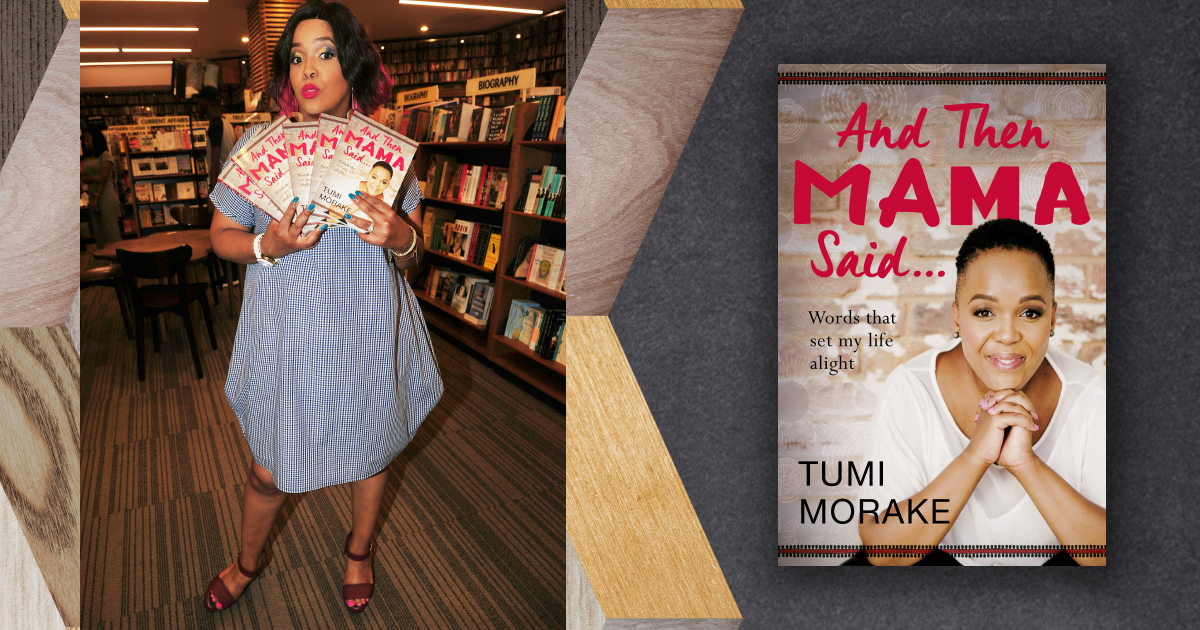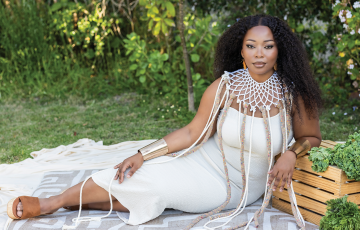And then Tumi said

Tumi Morake is an award- winning comedian who recently added author to her impressive list of achievements with the publication of her memoir, And Then Mama Said: Words that set my life alight. We get inspiration from the dynamic mother of three.
On 1 January this year Netflix streamed Comedians of the World, that features a series of stand-up comedy shows by 47 comedians from around the globe. Tumi Morake was in the line-up along with fellow South Africans Loyiso Gola, Loyiso Madinga and Riaad Moosa. She is the first African female to have a comedy set on Netflix. But the comedian hat is just one of the many she wears – she is an actress, TV host (she hosted Our Perfect Wedding and her own late-night show, #WTFTumi on SABC 3), radio presenter and now a published author. In her book, And Then Mama Said, Tumi reflects on her childhood, marriage, career, self-love and her relationship with her mother. The 162-page book, which took six months to write, is a love letter to her late mother, Tebogo Morake, who Tumi says was the centre of her universe. ‘The process of writing the book was more of a struggle than it was fun,’ says Tumi, who admits that she enjoyed retracing her life’s highlights and the work she has put into her career, but found it very difficult to revisit past traumas such as her rape ordeal at the age of 15.
CHALLENGES, CHANGES AND GROWTH
Tumi says she was very specific in selecting the stories she wanted to write about. She highlights moments in her life that she says challenged, changed and grew her. And Then Mama Said is Tumi’s way of allowing readers into her most intimate space. ‘My honesty was unexpected,’ she says. ‘The most important thing is that my family says my mother would be so proud. She was my pillar for the longest time, and I shared the parts of my life where I needed to draw strength from the things I learnt from the woman who raised me.’
HOME ROOTS
So is she still on speaking terms with her family, after the release of the book? ‘Yes, they all say they are proud,’ she says, ‘and all had memories of being there through a lot of what I shared in the book. I treated this book the same way I treat everything I do; I need to be able to look my family in the eye.’ She adds that they know whatever she does, it’s all out of love. Tebogo instilled in her children the knowledge that if the going ever got tough they could always go home, saying that as long as they had a home, they could survive anything. This is a lesson Tumi wants to pass on to her children; she wants them to be grounded in the knowledge that there will always be a home for them. ‘I come from a culture where we walk with our ancestors and consciously need to remember how our actions today will affect our descendants,’ she says.
SIMILAR BUT DIFFERENT
People often tell Tumi that she looks like her mother. She says they also shared the fighting spirit that sustained them through the years, but they had differing views on some issues. For example, she says her mother believed that a woman should first get married, and then have children. Tumi didn’t want to marry for the sake of having children and this worried her mother, who feared that she might never marry. As it happened, things didn’t play out the conventional way and she and her husband, Mpho Osei-Tutu, had their first child before they had completed their dowry (magadi) negotiations. The two met at Wits University, where they both studied drama. Mpho is also an actor and screen-writer and today they have three children together. ‘The best part of motherhood is seeing myself and my husband in our children,’ she smiles.
GRIT AND EDUCATION
Tebogo was a single mother of two children, and in the book Tumi details the challenges her mom faced with depression. An important lesson learnt from Tebogo was that where there is a problem, there is a solution. Tumi says she was encouraged to, ‘always look ahead and keep moving forward, no matter what.’
One of the most significant lessons Tebogo taught her was the importance of getting an education. ‘She encouraged me to focus on my studies and get my priorities straight,’ says Tumi, ‘and she also advised that I live a lifestyle in line with my salary bracket.’
SHE’S ‘NOT THE DYING TYPE’
Tumi has had her fair share of hurdles and obstacles in life, not least of which were the rape and, years later, a near-fatal car crash, but she doesn’t let trauma or challenges stop her from being true to herself. ‘I’m not the dying type,’ she smiles. ‘I just keep swimming!’ This is her approach to motherhood, marriage, her career, bullies, pain and fame. She was taught to stand firm, be battle-ready and make things happen. ‘This lesson helps me take on every challenge with my head held high,’ she says, adding that her book is dedicated to ‘everyone who is brave enough to chase their dreams through treacherous waters.’
Related articles

Latest Jet club magazine
We’ve got the latest trends, exciting prizes and exclusive savings just for you!
Jet Club will not pass your details to anyone else. By clicking the subscribe button you confirm you have read and agree to the Jet Club Terms and conditions and Jet Club Privacy Statement.
Subscribe


